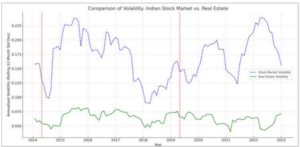India’s equity market is a powerhouse, attracting a vast array of domestic and international investors. With its potential for rapid gains and substantial returns, the stock market often stands as the go-to investment avenue. However, this allure comes with significant volatility, with prices subject to rapid fluctuations due to economic shifts and political developments. For instance, the 2024 elections showcased the market’s sensitivity, with the NIFTY 50 index experiencing swings of over 3% in a single day While the stock market has great potential for substantial returns, it’s wise for investors to not only focus on equities but also diversify into assets which offer a more certain and stable ROI. Real estate, with its relative stability and consistent growth, offers a compelling alternative.
Volatility Comparison
The Indian stock market’s volatility can be stark. In 2023, the Sensex saw a 5% drop in just one week due to global economic uncertainties. These rapid changes contrast sharply with the real estate market’s steady performance. Over the past decade, property prices in major cities have shown an average annual increase of 7-10%, according to the National Housing Bank. This stability makes real estate an attractive investment for those seeking reliable and steady income, less susceptible to short term market fluctuations.
The above graph illustrates the comparison of annualized volatility between the Indian stock market and the real estate market from 2014 to 2023.
The blue dashed line represents the volatility of the stock market, while the green solid line represents the volatility of the real estate market.

From the graph, it is evident that: Stock Market Volatility: The stock market exhibits significant volatility, with noticeable spikes around major economic and political events. The periods marked by the red dotted lines correspond to the general election years in India (2014, 2019, and 2024), where volatility spikes are particularly pronounced. For example, during the 2024 elections, the stock market experienced dramatic swings, highlighting its sensitivity to political developments. Real Estate Volatility: In contrast, the real estate market shows much lower volatility throughout the same period. The green line remains relatively stable, indicating consistent and predictable performance. Recent trends indicate a notable shift from the stock market to real estate, especially during market downturns. For example, in 2023, when the Sensex fell by 7% over two months due to global recession fears, real estate transactions in major cities like Mumbai and Bangalore saw a notable uptick of 15%. This migration underscores the stability and lower volatility of real estate, attracting investors seeking to preserve their wealth and generate steady returns.
In conclusion, India’s stock market offers opportunities for rapid gains but comes with higher risks and volatility. Real estate, in contrast, provides a more stable investment avenue with prospects for long-term growth. The anticipated expansion in the real estate market further underscores its potential as a robust investment vehicle in India’s dynamic economic landscape. By understanding these dynamics, investors can make informed decisions, balancing the high-risk, high-reward nature of the stock market with the steady, long-term benefits of real estate investment. The ongoing growth and transformation of the Indian real estate sector present an opportune moment for investment, promising both security and profitability for the discerning investor.

